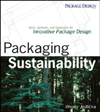SC Johnson Leading the Way in Reusable Plastic Packaging for Household Products

(Courtesy of SC Johnson)
The Ellen MacArthur Foundation and the UN Environment Programme have released their Global Commitment 2024 Progress Report, highlighting industry progress toward reducing plastic waste. SC Johnson, one of the world's leading manufacturers of household cleaning and other consumer and professional products, leads with the highest percentage of reusable plastic packaging in the Global Commitment's household and personal care sector, at 12%, and is working to grow that number. The company also achieved two key milestones - reducing virgin plastic and incorporating recycled materials into packaging - a year ahead of the 2025 commitment.
"Despite our progress and the industry's forward movement, there is still much to be done. Like the other businesses highlighted in this report, we've been taking voluntary steps to positively impact the plastic waste crisis, but to meet our shared goals we need government regulation," said Fisk Johnson, Chairman and CEO of SC Johnson. "Next week, people from all over the world will gather for the planned final global plastic pollution treaty negotiations. I hope we come out with a strong, reasonable UN treaty, which will evolve over time and spur much-needed collective action to end global plastic pollution."
The report highlights a set of plastic packaging commitments uniting more than 1,000 businesses, governments and other organizations with a vision for a circular economy for plastics. The report shows how "over the six years since the Global Commitment launched, signatories have significantly outperformed their peers in tackling plastic waste" by setting ambitious targets and driving action. However, according to the Ellen McArthur Foundation, while substantial progress has been made, a binding global policy and accelerated business action are needed to get the job done.
SC Johnson demonstrated meaningful advancement in all three of the key commitments evaluated by the Ellen MacArthur Foundation:
- Virgin Plastic Reduction: Since 2018, SC Johnson has reduced its total plastic footprint by 32%, achieving its goal of a 30% reduction a year ahead of the 2025 commitment.
- Post-Consumer Recycled Plastic: SC Johnson surpassed its goal of incorporating 25% post-consumer recycled (PCR) materials into its products, achieving this milestone a year ahead of the 2025 commitment.
- Recyclable, Reusable or Compostable Plastic Packaging: By offering multiple reuse options across major brands, the company leads with the highest percentage of reusable plastic packaging in the Commitment's household and personal care sector, at 12%. SC Johnson continues to work on improving its plastic packaging and the company is making progress in moving toward refill/reuse models.
By eliminating unnecessary plastics, increasing use of PCR content and lightweighting plastic packaging, SC Johnson surpassed its goal of incorporating 25% PCR materials into its products and reduced its total plastic footprint by 32%. Additionally, in partnership with leading European retailers, the company rolled out more than 700 Ecover® in-store refill machines, helping people further reduce their plastic footprint.
In addition to improving the circularity of its products, SC Johnson also enhanced its data collection system to automatically identify recyclable plastics, helping to pinpoint the best opportunities to redesign its packaging for better recyclability.
Looking for a reprint of this article?
From high-res PDFs to custom plaques, order your copy today!









